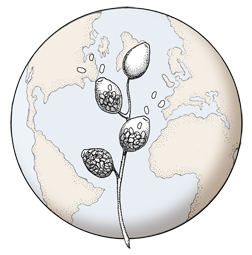Publication Type:
Journal ArticleSource:
New Zealand Journal of Forestry Science, Volume 41S, p.7–13 (2011)URL:
http://researchrepository.murdoch.edu.au/4375/Abstract:
With the rapidly growing international trade in plants and ongoing impacts of climate change, impacts of plant pathogens in the genus Phytophthora are increasing, threatening the biodiversity and sustainability of European forest ecosystems. Through the European Cooperation in Science and Technology (COST) framework Action FP0801, scientists and disease-control experts are working on Phytophthora in forest ecosystems with the overall aim of increasing understanding of the biology and ecology of Phytophthora species with potential to cause damage to European forestry. This knowledge will be used in the development of effective control and management protocols for the problems caused. Outcomes of the Action will be promoted in an effort to increase knowledge and awareness of the problem by disseminating information to end-users and authorities in the forestry sector, and to the general public. Four interrelated working groups have been established to (i) examine the ways in which Phytophthora species spread into and within Europe; (ii) determine how phytophthoras kill woody plants and elucidate mechanisms for host resistance; (iii) disseminate state-of-the-art rapid molecular diagnostic techniques, and (iv) seek sustainable protocols for management and control of the diseases. The project is expected to increase understanding of threats to forest ecosystems by Phytophthora, improve the ability to rapidly detect phytophthora in environmental samples, and provide sustainable management solutions to the diseases caused by these destructive organisms.


